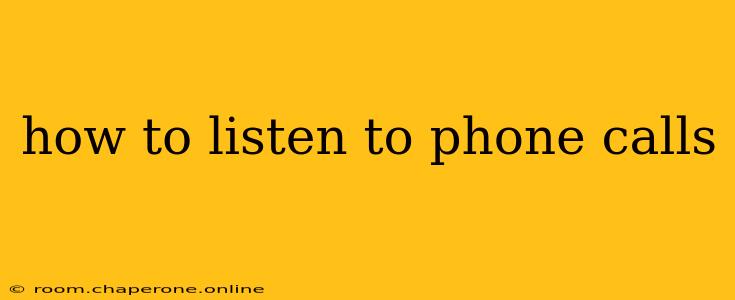Listening to phone calls can be necessary for various reasons, from monitoring children's safety to recording important business conversations. However, it's crucial to understand the legal and ethical implications before employing any method. This guide outlines different approaches, emphasizing the importance of respecting privacy laws and obtaining consent whenever possible.
Legal and Ethical Considerations: A Crucial First Step
Before delving into the technical aspects, it's paramount to understand the legal landscape. Recording phone calls without the consent of all parties involved is illegal in many jurisdictions. The laws vary significantly from state to state and country to country. Always check your local laws before attempting to record or listen to any phone call. Even if the call is on your own phone, you might need consent from the other party.
Failure to comply with these laws can lead to severe penalties, including hefty fines and even criminal charges. Ethical considerations also play a significant role. Respecting the privacy of others is paramount, and unauthorized recording is a serious breach of trust.
Methods for Listening to Phone Calls: A Detailed Breakdown
The methods available for listening to phone calls depend largely on the context and the devices involved.
1. Using Built-in Call Recording Features:
Many modern smartphones offer built-in call recording functionality. However, the availability and legality of this feature vary widely depending on your phone's operating system, your carrier, and your location. Check your phone's settings to see if this feature is enabled. If it is, ensure you understand and comply with all relevant laws before using it.
2. Using Third-Party Call Recording Apps:
Several apps available on app stores offer call recording capabilities. These apps often provide additional features such as cloud storage and transcription. Again, be absolutely certain that using these apps complies with the laws in your jurisdiction and that you have obtained necessary consent. Read reviews carefully before choosing an app, paying close attention to user comments about legal compliance and app performance.
3. Using Specialized Call Recording Hardware:
For professional purposes, such as call centers or businesses that require extensive call monitoring, specialized hardware might be used. These devices typically record calls directly from a phone line and often offer advanced features such as multiple line recording and secure storage. These systems are usually subject to stringent legal and regulatory requirements. Compliance with all applicable regulations is crucial.
4. Listening to Voicemails:
Accessing your own voicemail is a straightforward process, typically involving dialing a specific number or using a mobile app. Listening to someone else's voicemail without their permission is illegal and unethical.
Tips for Safe and Legal Call Recording:
- Obtain explicit consent: Always obtain clear consent from all parties involved before recording a phone call. Document this consent in writing whenever possible.
- Check local laws: Familiarize yourself with the laws regarding call recording in your jurisdiction. This is non-negotiable.
- Use reputable apps and hardware: Choose apps and hardware from trusted sources with a strong reputation for reliability and security.
- Store recordings securely: Protect recorded calls from unauthorized access by using secure storage methods and strong passwords.
- Be mindful of data privacy: Understand how your chosen method handles personal data and ensure compliance with relevant data protection regulations.
Conclusion: Proceed with Caution and Respect for the Law
Listening to phone calls requires careful consideration of legal and ethical implications. Always prioritize compliance with local laws and respect for privacy. Understanding the available methods and utilizing them responsibly is key to avoiding potential legal issues and maintaining ethical conduct. This guide provides a starting point, but always seek legal counsel if you have any doubts or concerns regarding call recording in your specific situation.

